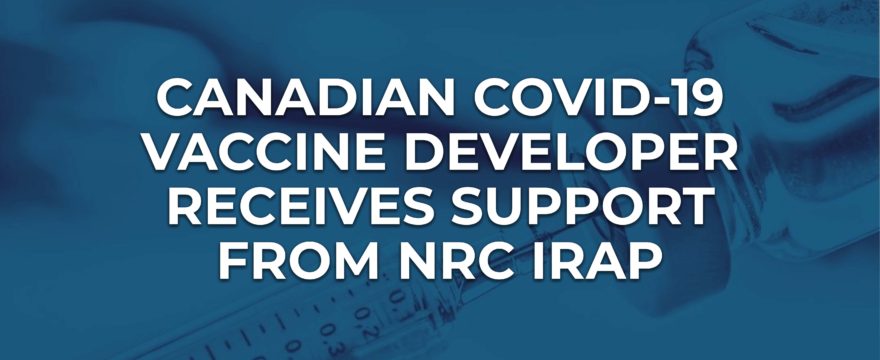
Canada’s first COVID-19 case occurred in Toronto on January 25, 2020. Since then, millions of cases have been reported around the world, with over 1 million in Canada alone. Pharmaceutical companies have worked tirelessly to develop effective vaccines in the fight against SARS-CoV-2, including Edmonton, Alberta-based firm Entos Pharmaceuticals. Here, we take a closer look at the role of government R&D funding programs, like the Scientific Research and Experimental Development (SR&ED) tax incentive program and National Research Council Canada Industrial Research Assistance Program (NRC IRAP) for Canada’s healthcare companies.
NRC IRAP-Funded Vaccine Could Be a Global Game-Changer
Five vaccines are currently approved for administration by Health Canada: Pfizer-BioNTech, AstraZeneca, Moderna, Johnson & Johnson (Janssen) and COVIDSHIELD. All of these vaccines were developed outside the country and rely on either mRNA or traditional vaccine technology. While very effective, they have a limited shelf life and require refrigeration and precise handling. This makes the existing vaccines difficult to administer in remote, rural areas and in countries where storage standards simply cannot be met.
Covigenix VAC-001, the COVID-19 immunization currently under development by Entos Pharmaceuticals, has the potential to revolutionize coronavirus vaccination as we know it. As a DNA vaccine, Covigenix VAC-001 works much like its mRNA-driven counterparts. The vaccine reproduces a small fraction of viral DNA, which tells our bodies they are under attack. Production of a specific cellular protein is triggered, activating our immune systems’ antibodies to fight the virus. After a short time, recipients will achieve effective resistance against COVID-19 infection.
A safe and effective DNA vaccine for COVID-19 could be ground-breaking in the domestic and international battles against this global pandemic. Advantages offered by this type of vaccine include:
- Stability at room temperature for up to 30 days
- Stability in refrigeration for up to one year
- Prepared in a ready-to-use concentration
All in all, the Entos Pharmaceuticals vaccine would be easier to store, distribute and administer outside urban centers and in developing nations. With new variants emerging at an alarming pace and global vaccination rates lagging, Covigenix VAC-001 could play a critical role in overcoming COVID-19.
The Role of SR&ED and NRC IRAP Funding in Vaccine Development
Like all innovations, new healthcare preventatives, treatments, and supplies are driven by research and development (R&D) work. These essential activities are often expensive and can be cost-prohibitive for many companies without financial support from government partners.
This support came in the form of $23.2 million in federal funding through NRC IRAP to develop COVID-19 vaccines, treatments, and other medical supplies. Among funds shared by six companies, Entos Pharmaceuticals received approximately $5 million to bring Covigenix VAC-001 to Phase 1 clinical trials. The company hopes to receive additional funding to support Phase 2 clinical trials by late spring of 2021.
Benefits for Public Health and Economic Growth
Companies like Entos Pharmaceuticals cannot complete the extensive R&D work required to create new medical technologies without reliable sources of capital. While all firms may generate revenues from existing products, take on loans, and secure equity investments, creating sufficient capital through these methods alone would be unlikely. The NRC IRAP and SR&ED tax incentive programs bridge this gap with funding that is available before and after costs are incurred for a wide range of qualifying expenditures.
The benefit of these programs stretches far beyond the companies that receive funding. Federal investment in R&D helps position Canada at the forefront of healthcare innovation. Work funded for COVID-19 vaccine development today will better prepare the country’s medical and pharmaceutical development and manufacturing companies for future public health risks with improved technologies, facilities, and processes.
At the same time, SR&ED tax credits and NRC IRAP funding are an investment in the strength and diversity of the Canadian economy. Providing the capital needed to sustain rigorous R&D work across the country will fuel opportunities in the health sciences and pharmaceutical sectors for years to come.
Taking Advantage of SR&ED Tax Credits and NRC IRAP Funding
If your company undertakes eligible R&D activities, it can receive SR&ED tax credits and NRC IRAP funding. While these programs may not be stacked to double benefits, they form part of a capital strategy that makes R&D work more affordable and technological and scientific advancement more achievable.
Additional non-refundable incentives are also available for select companies. When used alongside NRC IRAP grants, SR&ED tax credits reduce the cost and risk of R&D work to help companies like Entos Pharmaceuticals – and yours – contribute to essential innovations across numerous fields.
If your company receives SR&ED tax credits, waiting for a refund can delay the capital required to continue R&D work. Don’t let these delays slow your progress. With our Capital-as-a-Service (CaaS) platform, Easly provides quarterly advances on SR&ED refunds to help innovative Canadian companies receive funds faster.
Contact us today to see how we can streamline the process for your organization.
.png)
.png)
.png)
